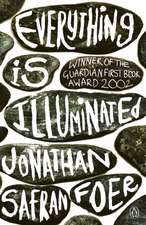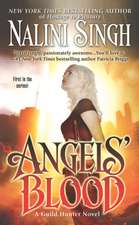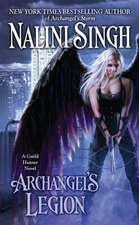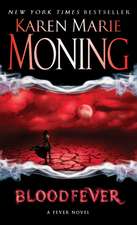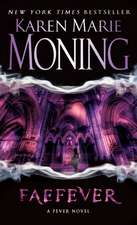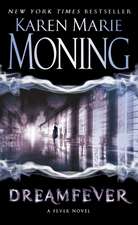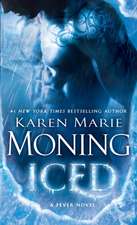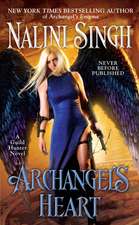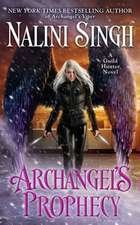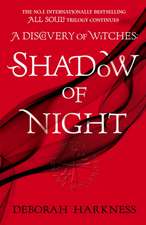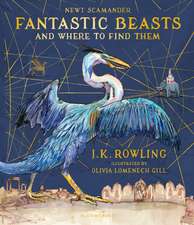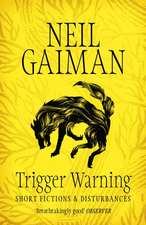Darkfever
Autor Karen Marie Moningen Limba Engleză Paperback – 31 aug 2007
Vezi toate premiile Carte premiată
MacKayla Lane’s life is good. She has great friends, a decent job, and a car that breaks down only every other week or so. In other words, she’s your perfectly ordinary twenty-first-century woman. Or so she thinks…until something extraordinary happens.
When her sister is murdered, leaving a single clue to her death–a cryptic message on Mac’s cell phone–Mac journeys to Ireland in search of answers. The quest to find her sister’s killer draws her into a shadowy realm where nothing is as it seems, where good and evil wear the same treacherously seductive mask. She is soon faced with an even greater challenge: staying alive long enough to learn how to handle a power she had no idea she possessed–a gift that allows her to see beyond the world of man, into the dangerous realm of the Fae….
As Mac delves deeper into the mystery of her sister’s death, her every move is shadowed by the dark, mysterious Jericho, a man with no past and only mockery for a future. As she begins to close in on the truth, the ruthless Vlane–an alpha Fae who makes sex an addiction for human women–closes in on her. And as the boundary between worlds begins to crumble, Mac’s true mission becomes clear: find the elusive Sinsar Dubh before someone else claims the all-powerful Dark Book–because whoever gets to it first holds nothing less than complete control of the very fabric of both worlds in their hands….
From the Hardcover edition.
| Toate formatele și edițiile | Preț | Express |
|---|---|---|
| Paperback (3) | 53.34 lei 22-36 zile | +26.79 lei 5-11 zile |
| Orion Publishing Group – 7 sep 2011 | 53.34 lei 22-36 zile | +26.79 lei 5-11 zile |
| Dell Publishing Company – 31 aug 2007 | 55.85 lei 22-36 zile | +17.44 lei 5-11 zile |
| PENGUIN RANDOM HOUSE LLC – 25 feb 2025 | 94.36 lei 22-36 zile | +10.25 lei 5-11 zile |
Preț: 55.85 lei
Nou
10.69€ • 11.19$ • 8.84£
Carte disponibilă
Livrare economică 17-31 martie
Livrare express 28 februarie-06 martie pentru 27.43 lei
Specificații
ISBN-10: 0440240980
Pagini: 349
Dimensiuni: 109 x 175 x 27 mm
Greutate: 0.21 kg
Editura: Dell Publishing Company
Colecția Bantam Books
Notă biografică
Karen Marie Moning is the internationally bestselling author of the Highlander and Fever novels. Her books have appeared on the New York Times, USA Today, and Publishers Weekly bestseller lists, and have one numerous awards, including the prestigious Rita. She lives in Georgia and Florida with her husband Neil and the world-traveling cat, Moonshadow.
From the Hardcover edition.
Extras
A year earlier . . .
July 9. Ashford, Georgia. Ninety–four degrees. Ninety–seven percent humidity.
It gets crazy hot in the South in the summer, but it’s worth it to have such short, mild winters. I like most all seasons and climes. I can get into an overcast drizzly autumn day–great for curling up with a good book–every bit as much as a cloudless blue summer sky, but I’ve never cared much for snow and ice. I don’t know how northerners put up with it. Or why. But I guess it’s a good thing they do, otherwise they’d all be down here crowding us out.
Native to the sultry southern heat, I was lounging by the pool in the backyard of my parents’ house, wearing my favorite pink polka–dotted bikini that went perfectly with my new I’m-not-really-a-waitress-pink manicure and pedicure. I was sprawled in a cushion-topped chaise soaking up the sun, my long blonde hair twisted up in a spiky knot on top of my head in one of those hairdos you really hope nobody ever catches you wearing. Mom and Dad were away on vacation, celebrating their thirtieth wedding anniversary with a twenty-one day island-hopping cruise through the tropics, which had begun two weeks ago in Maui and ended next weekend in Miami.
I’d been working devotedly on my tan in their absence, taking quick dips in the cool sparkling blue, then stretching out to let the sun toast drops of water from my skin, wishing my sister Alina was around to hang out with, and maybe invite a few friends over.
My iPod was tucked into my dad’s Bose sound dock on the patio table next to me, bopping cheerily through a playlist I’d put together specifically for poolside sunning, comprised of the top one hundred one-hit wonders from the past few decades, plus a few others that make me smile–happy mindless music to pass happy mindless time. It was currently playing an old Louis Armstrong song–“What a Wonderful World.” Born in a generation that thinks cynical and disenchanted is cool, sometimes I’m a little off the beaten track. Oh well.
A tall glass of chilled sweet tea was at hand, and the phone was nearby in case Mom and Dad made ground sooner than expected. They weren’t due ashore the next island until tomorrow, but twice now they’d landed sooner than scheduled. Since I’d accidentally dropped my cell phone in the pool a few days ago, I’d been toting the cordless around so I wouldn’t miss a call.
Fact was, I missed my parents like crazy.
At first, when they left, I’d been elated by the prospect of time alone. I live at home and when my parents are there the house sometimes feels annoyingly like Grand Central Station, with Mom’s friends, Dad’s golf buddies, and ladies from the church popping in, punctuated by neighborhood kids stopping over with one excuse or another, conveniently clad in their swim trunks–gee, could they be angling for an invitation?
But after two weeks of much longed for solitude, I’d begun choking on it. The rambling house seemed achingly quiet, especially in the evenings. Around supper time I’d been feeling downright lost. Hungry, too. Mom’s an amazing cook and I’d burned out fast on pizza, potato chips, and mac-’n’-cheese. I couldn’t wait for one of her fried chicken, mashed potatoes, fresh turnip greens, and peach pie with homemade whipped-cream dinners. I’d even done the grocery shopping in anticipation, stocking up on everything she needed.
I love to eat. Fortunately, it doesn’t show. I’m healthy through the bust and bottom, but slim through the waist and thighs. I have good metabolism, though Mom says, Ha, wait until you’re thirty. Then forty, then fifty. Dad says, More to love, Rainey and gives Mom a look that makes me concentrate really hard on something else. Anything else. I adore my parents, but there’s such a thing as TMI. Too much information.
All in all, I have a great life, short of missing my parents and counting the days until Alina gets home from Ireland, but both of those are temporary, soon to be rectified. My life will go back to being perfect again before much longer.
Is there such a thing as tempting the Fates to slice one of the most important threads that holds your life together simply by being too happy?
When the phone rang, I thought it was my parents.
It wasn’t.
It’s funny how such a tiny, insignificant, dozen-times-a-day action can become a line of demarcation.
The picking up of a phone. The pressing of an on button.
Before I pressed it–as far as I knew–my sister Alina was alive. At the moment of pressing, my life split into two distinct epochs: Before the call and After.
Before the call, I had no use for a word like “demarcation,” one of those fifty-cent words I knew only because I was an avid reader. Before, I floated through life from one happy moment to the next. Before, I thought I knew everything. I thought I knew who I was, where I fit, and exactly what my future would bring.
Before, I thought I knew I had a future.
After, I began to discover that I’d never really known anything at all.
I waited two weeks from the day that I learned my sister had been murdered for somebody to do something–anything–besides plant her in the ground after a closed-casket funeral, cover her with roses, and grieve.
Grieving wasn’t going to bring her back, and it sure wasn’t going to make me feel better about whoever’d killed her walking around alive out there somewhere, happy in their sick little psychotic way, while my sister lay icy and white beneath six feet of dirt.
Those weeks will remain forever foggy to me. I wept the entire time, vision and memory blurred by tears. My tears were involuntary. My soul was leaking. Alina wasn’t just my sister; she was my best friend. Though she’d-mailed incessantly and spoken weekly, sharing everything, keeping no secrets.
Or so I thought. Boy was I ever wrong.
We’d been planning to get an apartment together when she came home. We’d been planning to move to the city, where I was finally going to get serious about college, and Alina was going to work on her Ph.D at the same Atlanta University. It was no secret that my sister had gotten all the ambition in the family. Since graduating high school, I’d been perfectly content bartending at The Brickyard four or five nights a week, living at home, saving most of my money, and taking just enough college courses at the local po-dunk university (one or two a semester, and classes like How to Use the Internet and Travel Etiquette didn’t cut it with my folks) to keep Mom and Dad reasonably hopeful that I might one day graduate and get a Real Job in the Real World. Still, ambition or no, I’d been planning to really buckle down and make some big changes in my life when Alina returned.
When I’d said good-bye to her months ago at the airport, the thought that I wouldn’t see her alive again had never crossed my mind. Alina was as certain as the sun rising and setting. She was charmed. She was twenty-four and I was twenty-two. We were going to live forever. Thirty was a million light-years away. Forty wasn’t even in the same galaxy. Death? Ha. Death happened to really old people.
Not.
After two weeks, my teary fog started to lift a little. I didn’t stop hurting. I think I just finally expelled the last drop of moisture from my body that wasn’t absolutely necessary to keep me alive. And rage watered my parched soul. I wanted answers. I wanted justice.
I wanted revenge.
I seemed to be the only one.
I’d taken a Psych course a few years back that said people dealt with death by working their way through stages of grief. I hadn’t gotten to wallow in the numbness of denial that’s supposed to be the first phase. I’d flashed straight from numb to pain in the space of a heartbeat. With Mom and Dad away, I was the one who’d had to identify her body. It hadn’t been pretty and there’d been no way to deny Alina was dead.
After two weeks, I was thick into the anger phase. Depression was supposed to be next. Then, if one was healthy, acceptance. Already I could see the beginning signs of acceptance in those around me, as if they’d moved directly from numbness to defeat. They talked of “random acts of violence.” They spoke about “getting on with life.” They said they were “sure things were in good hands with the police.”
I was so not healthy. Nor was I remotely sure about the police in Ireland.
Accept Alina’s death?
Never.
“You’re not going, Mac, and that’s final.” Mom stood at the kitchen counter, a towel draped over her shoulder, a cheery red, yellow, and white magnolia-printed apron tied at her waist, her hands dusted with flour.
She’d been baking. And cooking. And cleaning. And baking some more. She’d become a veritable Tasmanian devil of domesticity. Born and raised in the Deep South, it was Mom’s way of trying to deal. Down here, women nest like mother hens when people die. It’s just what they do.
We’d been arguing for the past hour. Last night the Dublin police had called to tell us that they were terribly sorry, but due to a lack of evidence, in light of the fact that they didn’t have a single lead or witness, there was nothing left to pursue. They were giving us official notice that they’d had no choice but to turn Alina’s case over to the unsolved division, which anyone with half a brain knew wasn’t a division at all but a filing cabinet in a dimly lit and largely forgotten basement storeroom somewhere. Despite assurances they would periodically re-examine the case for new evidence, that they would exercise utmost due diligence, the message was clear: Alina was dead, shipped back to her own country, and no longer their concern.
They’d given up.
Was that record time or what? Three weeks. A measly twenty-one days. It was inconceivable!
“You can bet your butt if we lived over there, they’d never have given up so quickly,” I said bitterly.
“You don’t know that, Mac.” Mom pushed ash-blonde bangs back from blue eyes that were red-rimmed from weeping, leaving a smudge of flour on her brow.
“Give me the chance to find out.”
Her lips compressed into a thin white-edged line. “Absolutely not. I’ve already lost one daughter to that country. I will not lose another.”
Impasse. And here we’d been ever since breakfast when I’d announced my decision to take time off so I could go to Dublin and find out what the police had really been doing to solve Alina’s murder.
I would demand a copy of the file, and do all in my power to motivate them to continue their investigation. I would give a face and a voice–a loud and hopefully highly persuasive one–to the victim’s family. I couldn’t shake the belief that if only my sister had a representative in Dublin, the investigation would be taken more seriously.
I’d tried to get Dad to go, but there just wasn’t any reaching him right now. He was lost in grief. Though our faces and builds were very different, I have the same color hair and eyes as Alina, and the few times he’d actually looked at me lately, he’d gotten such an awful look on his face that it had made me wish I was invisible. Or brunette with brown eyes like him, instead of sunny blonde with green.
Initially, after the funeral, he’d been a dynamo of determined action, making endless phone calls, contacting anyone and everyone. The embassy had been kind, but directed him to Interpol. Interpol had kept him busy for a few days “looking into things” before diplomatically referring him back to where he’d begun–the Dublin police. The Dublin police remained unwavering. No evidence. No leads. Nothing to investigate. If you have a problem with that, sir, contact your embassy.
He called the Ashford police–no, they couldn’t go to Ireland and look into it. He called the Dublin police again–were they sure they’d interviewed every last one of Alina’s friends and fellow students and professors? I hadn’t needed to hear both sides of that conversation to know the Dublin police were getting testy.
He’d finally placed a call to an old college friend of his that held some high-powered, hush-hush position in the government. Whatever that friend said had deflated him completely. He’d closed the door on us and not come out since.
The climate was decidedly grim in the Lane house, with Mom a tornado in the kitchen, and Dad a black hole in the study. I couldn’t sit around forever waiting for them to snap out of it. Time was wasting and the trail was growing colder by the minute. If someone was going to do something, it had to be now, which meant it had to be me.
I said, “I’m going and I don’t care if you like it or not.”
Mom burst into tears. She slapped the dough she’d been kneading down on the counter and ran out of the room. After a moment, I heard the bedroom door slam down the hall.
That’s one thing I can’t handle–my mom’s tears. As if she hadn’t been crying enough lately, I’d just made her cry again. I slunk from the kitchen and crept upstairs, feeling like the absolute lowest of the lowest scum on the face of the earth.
I got out of my pajamas, showered, dried my hair and dressed, then stood at a complete loss for a while, staring blankly down the hall at Alina’s closed bedroom door.
How many thousands of times had we called back and forth during the day, whispered back and forth during the night, woken each other up for comfort when we’d had bad dreams?
I was on my own with bad dreams now.
Get a grip, Mac. I shook myself and decided to head up to campus. If I stayed home, the black hole might get me, too. Even now I could feel its event horizon expanding exponentially.
On the drive uptown, I recalled that I’d dropped my cell phone in the pool–God, had it really been all those weeks ago?–and decided I’d better stop at the mall to get a new one in case my parents needed to reach me while I was out.
If they even noticed I was gone.
I stopped at the store, bought the cheapest Nokia they had, got the old one deactivated, and powered up the replacement.
I had fourteen new messages, which was probably a record for me. I’m hardly a social butterfly. I’m not one of those plugged-in people who are always hooked up to the latest greatest find-me service. The idea-messaging capability. I don’t have Internet service or satellite radio, just your basic account, thank you. The only other gadget I need is my trusty iPod–music is my great escape.
I got back in my car, turned on the engine so the air conditioner could do battle with July’s relentless heat, and began listening to my messages. Most of them were weeks old, from friends at school or The Brickyard who I’d talked to since the funeral.
I guess, somewhere in the back of my mind, I’d made the connection that I’d lost cell service a few days before Alina had died and was hoping I might have a message from her. Hoping she might have called, sounding happy before she died. Hoping she might have said something that would make me forget my grief, if only for a short while. I was desperate to hear her voice just one more time.
When I did, I almost dropped the phone. Her voice burst from the tiny speaker, sounding frantic, terrified.
“Mac! Oh God, Mac, where are you? I need to talk to you! It rolled straight into your voice mail! What are you doing with your cell phone turned off? You’ve got to call me the minute you get this! I mean, the very instant!”
Despite the oppressive summer heat, I was suddenly icy, my skin clammy.
“Oh, Mac, everything has gone so wrong! I thought I knew what I was doing. I thought he was helping me, but–God, I can’t believe I was so stupid! I thought I was in love with him and he’s one of them, Mac! He’s one of them!”
I blinked uncomprehendingly. One of who? For that matter, who was this “he” that was one of “them” in the first place? Alina–in love? No way! Alina and I told each other everything. Aside from a few guys she’d dated casually her first months in Dublin, she’d not mentioned any other guy in her life. And certainly not one she was in love with!
Her voice caught on a sob. My hand tightened to a death grip on the phone, as if maybe I could hold onto my sister through it. Keep this Alina alive and safe from harm. I got a few seconds of static, then, when she spoke again she’d lowered her voice, as if fearful of being overheard.
“We’ve got to talk, Mac! There’s so much you don’t know. My God, you don’t even know what you are! There are so many things I should have told you, but I thought I could keep you out of it until things were safer for us. I’m going to try to make it home”–she broke off and laughed bitterly, a caustic sound totally unlike Alina–“but I don’t think he’ll let me out of the country. I’ll call you as soon–” More static. A gasp. “Oh, Mac, he’s coming!” Her voice dropped to an urgent whisper. “Listen to me! We’ve got to find the”–her next word sounded garbled or foreign, something like shi-sadu, I thought. “Everything depends on it. We can’t let them have it! We’ve got to get to it first! He’s been lying to me all along. I know what it is now and I know where–”
Dead air.
The call had been terminated.
I sat stunned, trying to make sense of what I’d just heard. I thought I must have a split personality and there were two Macs: one that had a clue about what was going on in the world around her, and one that could barely track reality well enough to get dressed in the morning and put her shoes on the right feet. Mac-that-had-a-clue must have died when Alina did, because this Mac obviously didn’t know the first thing about her sister.
She’d been in love and never mentioned it to me! Not once. And now it seemed that was the least of the things she’d not told me. I was flabbergasted. I was betrayed. There was a whole, huge part of my sister’s life that she’d been withholding from me for months.
What kind of danger had she been in? What had she been trying to keep me out of? Until what was safer for us? What did we have to find? Had it been the man she’d thought she was in love with that had killed her? Why–oh why–hadn’t she told me his name?
I checked the date and time on the call–the afternoon after I’d dropped my cell phone in the pool. I felt sick to my stomach. She’d needed me and I hadn’t been there for her. At the moment Alina had been so frantically trying to reach me, I’d been sunning lazily in the backyard, listening to my top one hundred mindless happy songs, my cell phone lying short-circuited and forgotten on the dining-room table.
I carefully pressed the save key then listened to the rest of the messages, hoping she might have called back, but there was nothing else. According to the police, she’d died approximately four hours after she’d tried reaching me, although they hadn’t found her body in an alley for nearly two days.
That was a visual I always worked real hard to block.
I closed my eyes and tried not to dwell on the thought that I’d missed my last chance to talk to her, tried not to think that maybe I could have done something to save her if only I’d answered. Those thoughts could make me crazy.
I replayed the message again. What was a shi-sadu? And what was the deal with her cryptic, You don’t even know what you are? What could Alina possibly have meant by that?
By my third run-through, I knew the message by heart.
I also knew that there was no way I could play it for Mom and Dad. Not only would it drive them further off the deep end (if there was a deeper end than the one they were currently off), but they’d probably lock me in my room and throw away the key. I couldn’t see them taking any chances with their remaining child.
But . . . if I went to Dublin and played it for the police, they’d have to reopen her case, wouldn’t they? This was a bona fide lead. If Alina had been in love with someone, she would have been seen with him at some point, somewhere. At school, at her apartment, at work, somewhere. Somebody would know who he was.
And if the mystery man wasn’t her killer, surely he was the key to discovering who was. After all, he was “one of them.”
I frowned.
Whoever or whatever “they” were.
From the Hardcover edition.
Recenzii
“A wonderful dark fantasy…give yourself a treat and read outside the box.” —Charlaine Harris
“A compelling world filled with mystery and vivid characters…will stoke readers’ fervor for Bloodfever, the next installment.” —Publishers Weekly
“Clear off space on your keeper shelf—this sharp series looks to be amazing.” —Romantic Times
From the Hardcover edition.
Descriere
MacKayla Lane’s life is good. She has great friends, a decent job, and a car that breaks down only every other week or so. In other words, she’s your perfectly ordinary twenty-first-century woman. Or so she thinks…until something extraordinary happens.
When her sister is murdered, leaving a single clue to her death–a cryptic message on Mac’s cell phone–Mac journeys to Ireland in search of answers. The quest to find her sister’s killer draws her into a shadowy realm where nothing is as it seems, where good and evil wear the same treacherously seductive mask. She is soon faced with an even greater challenge: staying alive long enough to learn how to handle a power she had no idea she possessed–a gift that allows her to see beyond the world of man, into the dangerous realm of the Fae….
As Mac delves deeper into the mystery of her sister’s death, her every move is shadowed by the dark, mysterious Jericho, a man with no past and only mockery for a future. As she begins to close in on the truth, the ruthless Vlane–an alpha Fae who makes sex an addiction for human women–closes in on her. And as the boundary between worlds begins to crumble, Mac’s true mission becomes clear: find the elusive Sinsar Dubh before someone else claims the all-powerful Dark Book–because whoever gets to it first holds nothing less than complete control of the very fabric of both worlds in their hands….
From the Hardcover edition.
Premii
- Audies Finalist, 2007


